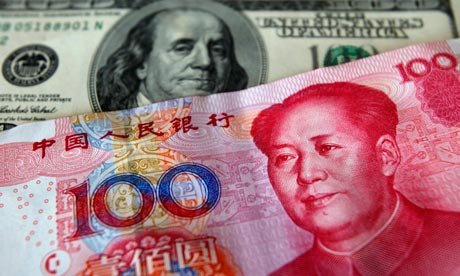
The philosophical undercurrents of Chinese society has always been reverence to the past, societal duty based on position, and a desire for social harmony.
by Jack JC
I have been asked on many occasions to write an article on China similar to one I wrote on the USA ‘Manifest Destiny to PNAC’‘ in the hope that it will foster better understanding of China’s cultural heritage. This is not an easy task.
China is virtually the only country where you can dig up an 800,000 year old bone, and their descendants still live there. This was illustrated to me while I was preparing for a business presentation, needed a different angle for my audience, and asked my wife how many years her family had farmed the ancestral land – the answer was 25 generations. I found out that her family keeps a book of the family tree, now in two thick volumes. To add further shock, the book traces her ancestral line to Liu Bei who was descended from Emperor Jing of the Han Dynasty and himself Emperor of Hu Shan during the three kingdoms period of China – in about 200 AD.
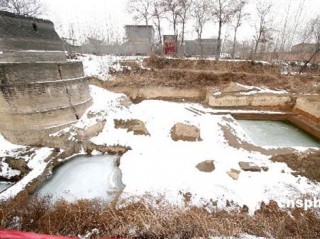
Unlike most countries, China doesn’t have a defined beginning; it starts as a myth, grows into a legend, and slowly materializes from legend to reality.
With mountain ranges, harsh terrain, and oceans blocking excessive migration into the region, China was well placed to develop a unique and relatively stable society.
The land is fertile, and produces anything an aspiring civilization could desire.
Large human habitations dating from 1.3 million BC have been located, suggesting that socialization started early in Chinese civilization.
http://history.cultural-china.com/en/52History6276.html
http://archaeology.about.com/od/glossary/qt/zhoukoudian.htm
http://en.wikipedia.org/wiki/Xiaochangliang
Over time, Paleolithic sites yield to Neolithic, and in 18,000 BC we find the Chinese making the oldest known pottery to store grains and living in communities, suggesting organized society and agriculture of some sort. http://anthropology.net/2009/06/02/oldest-known-pottery-found-in-yuchanyan-cave-hunan-china/
In 10,000 BC we find a series of overlapping similar cultures; the first known regular agricultural practices are well established, as are towns and a government that stored millet for future use.http://news.xinhuanet.com/english2010/china/2011-10/16/c_131194232.htm http://www.chinaknowledge.de/History/Myth/prehistory-map.html
Large cities appeared around 6,000 BC as did the first forms of Chinese writing. http://english.people.com.cn/200506/27/eng20050627_192620.html http://www.chinaculture.org/gb/en_artqa/2006-07/28/content_84128.htm
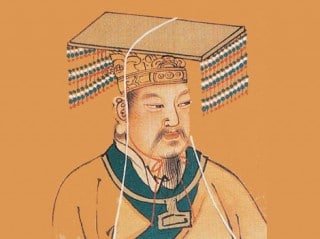
Huangdi set the cultural emphasis on harmony, social cohesion, and duty. He is attributed with discovering agriculture, irrigation, carts, animal husbandry, mathematics, astronomy and so forth but in a departure from other mythical or semi-mythical founders he shares credit for many discoveries with his advisers.
It was a descendant of Huangdi who was the first Emperor of Xia, leading to a line of 17 Emperors.
Little is known about the Xia other than what has been excavated, but they had a lunar calendar, agriculture, and almost certainly writing. They were believed to be the first Chinese dynasty to cast bronze until three tombs were opened containing advanced bronze metallurgy and predating the Xia by 500 years.
It is thought that justice and propriety were keystones of Xia culture as embodied in the term HuaXia. (http://en.wikipedia.org/wiki/Huaxia) The last Xia Emperor Jie was ineffectual at ruling and was deposed by the Shang Dynasty ending about 400 years of rule. Remarkably, other than the uprising to depose Jie, there are few legends of battle or warfare suggesting that the land was relatively peaceful. http://www.history-of-china.com/xia-dynasty/
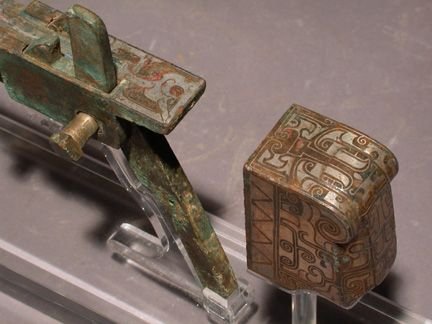
The Shang Dynasty ruled for 30 generations and produced the most advanced cast bronze articles in the world at that time. The Shang used divination and wrote their history in oracle bones. Items from the Shang period exhibit very high quality workmanship but they were a warrior people and are credited with the first use of slavery in China.
For the first time there was evidence of a priest caste and human sacrifice was practiced. It is from the Shang that ancestor worship is thought to have started. In 1,000 BC the last Shang ruler was deposed by the Zhou for his lack of care in ruling the realm, ending 600 years of rule.
Evidence of other great Chinese civilizations contemporary with Shang have been found suggesting that Shang was not as widespread as originally thought, and is only one of several epicenters of Chinese philosophy and culture. http://www.history-of-china.com/shang-dynasty/
It is alleged that during the Zhou dynasty the great classical philosopher Lao Tzu appeared, whose teachings spawned Taoism. Taoism is unique in that it became a religion but it is not a religion, it is more a philosophical look at life, and Lao Tzu deplored the rituals that eventually grew around it. Taoism stresses that religions cloud your mind to the realities around you and the wise man therefore refutes religion to better see ‘the way’ of life. Taoism also stresses harmony, in life, in love, in duty, in work, and in pleasure, all things must balance. As an example, if a river were cutting a channel to create a ring lake, you would help the river only so much as the river needed, letting the river do most of the work – work with nature and don’t fight it.
Taoism is one of the native religions or philosophies of China and its’ beginning actually predates Lao Tzu as attested by silk tapestries in tombs that attribute Taoism to Huangdi and even before. The Three Jewels of the Tao: compassion, moderation, and humility.
What is remarkable about Chinese civilizations is that a well defined secular priest or deity cult never appeared except under the Shang and then disappeared. The essence of Lao Tzu’s teachings are found in the Tao Te Ching (http://history.hanover.edu/courses/excerpts/261lao.html).
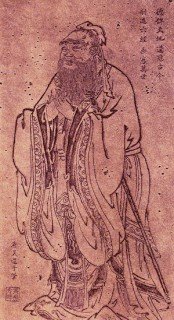
During the Zhou dynasty we also find the birth of K’ung Fu Zi, or Confucious. He teaches with respect to propriety and filial duty; dealing with justice and sincerity in government and personal lives.
In effect, he believed that the best forms of government were based on family and family values, including respect for ones elders and ancestors. Culturally influenced by the ages old philosophy of Taoism, he doesn’t so much teach new information but provides a wise insight into the deeper meanings. It is arguable whether his teachings are a religion, or a philosophy as his teachings advise people to think deeply for themselves and progress in their learning, while retaining their sense of propriety, humility, duty and justice.
His book ‘The Analects’ discusses his teachings, and was written by his students. http://www.pages.drexel.edu/~dat23/books/world/confcs.htm http://www.history-of-china.com/Zhou-dynasty/
With the fall of the Zhou dynasty we enter the warring states period, where seven states were fighting for control of the empire.
It is during this time that Sun Tzu writes one of the worlds most enduring political and military texts ‘The Art of War’ based on Taoist philosophy. Finally, by adopting Legalism to assist his province, Qin conquers all and we enter the Legalist period of Chinese history – it was destined to last for one Emperor only. http://web.cn.edu/kwheeler/chinese_legalism.html
To a Legalist, the law was supreme, a place for everybody in a meritocratic system and any upward motion within the meritocracy was the result of your capabilities regardless of your birth position.
Breaking the law was punishable by severe penalty, frequently death for the transgressor and family. One of the benefits this system offered Qin was a state with capable people in the position they were best suited for, and where the inhabitants were directed towards one sole intent, to unify China. Qin became the first empire encompassing all of China around 200 BC and it lasted about 15 years. With the death of the Qin Emperor, a revolt overthrew this dynasty and the Han Dyasty followed.
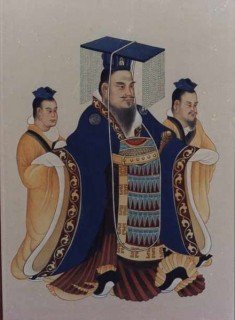
Lasting over 400 years the Han Dynasty built on the teachings of Lao Tzu and K’ung Fu Zi veneered over Legalism to produce the forerunner of modern Chinese civilization. At this time Buddhism is also thought to have made its’ appearance into China, providing for the first time a lasting secular priest caste. http://depts.washington.edu/chinaciv/bud/5budhism.htm
During the Han reign, the basis of Chinese leadership was to provide strict laws with a system of rewards and punishments for all, nobody was above the law. The ruler was also bound to choose the best advisers available and rule with the best interests of the people at hand ensuring that taxes were not unbearable, and that commerce and the arts flourished while protected by a strong army.
Many dynasty’s followed the Han in a series of 300-600 year reigns with 40 to 100 years of struggle between before the next dynasty rose. It is an ancient Chinese curse “May you be born in interesting times” referring to the infrequent spates in China where the next dynasty was as yet unformed. http://afe.easia.columbia.edu/timelines/china_timeline.htm
In response to outside pressure involving drugs, trade, and military power the Chinese Imperial system collapsed in 1911, having guided China since the days of Huangdi and probably before.
In it’s place the western powers Britain, France, Germany, and the USA imposed a federal system involving a dictator, Chiang Kai Shek who was later deposed by the Communist Peoples Party led by Mao Zhedong. To illustrate how the Chinese operate, the Kuomintang and the CCP often coordinated efforts to fight the Japanese together while at the same time fighting for control of China. With the Japanese defeated and removed from China in 1945, in 1949 the CCP drove the Kuomintang out of China onto Taiwan where they were supported by the western powers and given a spot representing all China at the United Nations. Later, with Russian pressure, this decision was reversed.
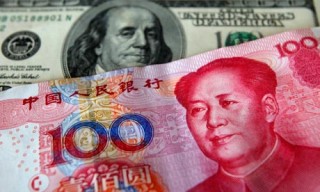 It was under Mao that China forestalled the western powers attempts to cut China into protectorates, restored the Qing Dynasty boundaries, and reversed the British tendency to cut slices out of China for their own Raj.
It was under Mao that China forestalled the western powers attempts to cut China into protectorates, restored the Qing Dynasty boundaries, and reversed the British tendency to cut slices out of China for their own Raj.
Today, after 60 years of Communist Party rule, China has the largest foreign cash reserves, is the second largest economy that is growing at an annualized rate of around 9%, and is the third country to place man in space, planning a lunar jaunt and a space station.
The philosophical undercurrents of Chinese society has always been reverence to the past, societal duty based on position, and a desire for social harmony. Although fiercely resistant to territorial incursions, the Chinese use force as a last resort. They have a high regard for education, artistic ability, and wisdom. Churchill once said “Beware the sleeping dragon, for when she wakes the earth will shake”. With a society that can be melded together like no other, a leadership style that conveys a long political tenure with a high education, and a cultural philosophy that places non interference in external affairs with a cultural business sense, China is in a strong position to make Churchill’s words prophetic.
Edited by Debbie Menon
They are proud as Chinese — Fareed Zakaria
Jack JC, is a reserve Officer in a NATO aligned country, he has a Bachelors Degree in Mechanical Engineering and an interest in the strategic effects history and culture bring to present geo-political affairs. As an international traveler he has friends and family serving in both NATO and non-NATO countries and would prefer that his friends and family in both camps not kill each other. He has operated at senior corporate levels of management, and has developed equipment for both civilian and military use.
ATTENTION READERS
We See The World From All Sides and Want YOU To Be Fully InformedIn fact, intentional disinformation is a disgraceful scourge in media today. So to assuage any possible errant incorrect information posted herein, we strongly encourage you to seek corroboration from other non-VT sources before forming an educated opinion.
About VT - Policies & Disclosures - Comment Policy

